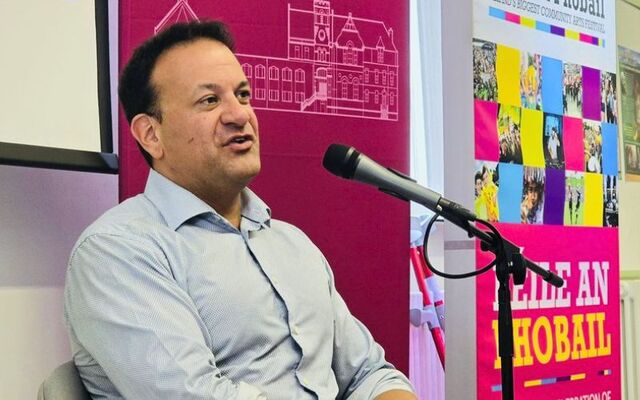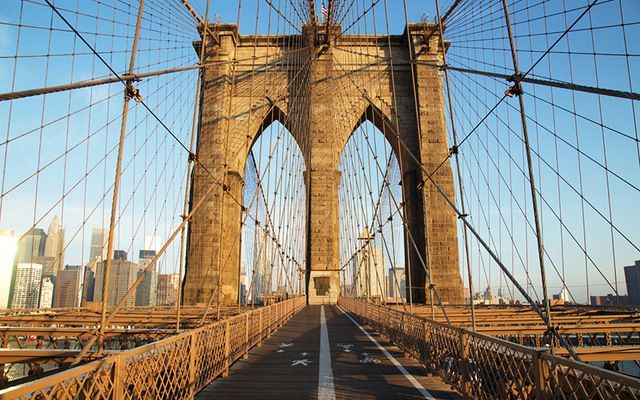Former Taoiseach Leo Varadkar addressed a packed hall at an event hosted by Ireland’s Future and Féile an Phobail. His appearance and his message marked a striking shift from his party’s past, signaling a deeper engagement with the idea of a New Ireland.
On an unbelievably warm and sunny Friday afternoon, former Irish Taoiseach (Prime Minister) Leo Varadkar came to St. Mary’s College in West Belfast to headline an event produced by the groups Ireland’s Future and Féile an Phobail (a West Belfast community organization), on June 20.
It was a testament to the power of the issue and earlier events put on by Ireland’s Future that the crowd at the event took over an entire lecture hall and most of a nearby overflow hall.
Everything in Ireland has a back story to it, and the back story here is that Varadkar’s former political party, Fine Gael, is traditionally seen as not very committed to the idea of Irish unity. So, it was quite significant that in West Belfast, in what is probably the heart of the Sinn Féin/Irish nationalist community, such a good crowd turned out.
Varadkar retired from politics after the Irish elections in 2025. Since he left office, Varadkar has become more outspoken on Irish unity than he ever was in office. Emma Little-Pengelly, Northern Ireland’s Deputy First Minister, said recently that Varadkar was “reinventing himself” with his increased support for Irish unity. In his remarks, Varadkar tacitly acknowledged his increased enthusiasm for Irish Unity.
Wherever you stand in Irish politics, you have to acknowledge that Varadkar is an experienced politician. He knows how to build coalitions and count votes. Early on in his remarks, which were expertly moderated by Reverend Karen Sethuraman of Ireland’s Future, Varadkar pointed out that “nothing in politics is inevitable” and that this includes a united Ireland.
The implication was clear: if there is to be a united Ireland, it will take work.
"Aspiration isn’t enough"
In what could easily be regarded as a criticism of his time in office, Varadkar said, "Just saying it [a united Ireland] is an aspiration isn’t enough anymore.
"I have proposed the establishment of a forum for parties interested in talking about unity. I hope, at some point, in the term of this Government, that decision will be taken.”
In quite clear and specific language, Varadkar said that a united Ireland did not mean that the Irish Republic would be taking over the North. Instead, Varadkar argued that what he and others at Ireland’s Future were talking about was a New Ireland.
This would entail a new health care and education system and economic integration. The key challenge that supporters of a New Ireland face is to make the benefits tangible to the people of Ireland, both in Northern Ireland and in the Republic of Ireland. For example, the economy in a New Ireland will mean an economy that will allow your children to live in the place they have grown up and a new Ireland will mean a healthcare system that delivers quality care for all.
The most significant part of Varadkar’s remarks was when he argued that while politicians and political parties would be very important in creating and winning a referendum for Irish unity, in the end, it would be a grassroots movement that would win any referendum on Irish unity.
To back up his argument, Varadkar pointed to the marriage equality referendum in 2015 and the abortion referendum in 2018. Both referendums passed by wide majorities. By citing these examples, Varadkar is implicitly arguing that for a New Ireland to become a reality, you will need to have a significant majority. The Good Friday/Belfast Agreement implies that all that is needed for a successful referendum is 50 percent plus one vote.
Perhaps the most significant part of Varadkar’s remarks was when he described the current debate over Irish unity as something that was the logical outcome of the Good Friday/Belfast Agreement. Varadkar’s remarks here make a lot of sense.
They are also a good reminder that Irish unity will take work by politicians and grassroots work by activists.
The fact that you have a former Fine Gael taoiseach discussing Irish unity before a packed audience in West Belfast is a sure sign that there is a conversation going on in both Northern Ireland and the Irish Republic about Irish unity.
This article was submitted to the IrishCentral contributors network by a member of the global Irish community. To become an IrishCentral contributor click here.




Comments